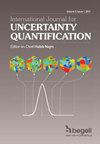SOLVING STOCHASTIC INVERSE PROBLEMS FOR CFD USING DATA-CONSISTENT INVERSION AND AN ADAPTIVE STOCHASTIC COLLOCATION METHOD
IF 1.8
4区 工程技术
Q2 ENGINEERING, MULTIDISCIPLINARY
International Journal for Uncertainty Quantification
Pub Date : 2024-04-01
DOI:10.1615/int.j.uncertaintyquantification.2024049566
引用次数: 0
Abstract
We present a non-intrusive adaptive stochastic collocation method coupled with a data-consistent inference framework to optimize stochastic inverse problems solve in CFD. The purpose of the proposed data-consistent method is, given a model and some observed output probability density function (pdf), to build a new model input pdf which is consistent with both the model and the data. Solving stochastic inverse problems in CFD is however very costly, which is why we use a surrogate or metamodel in the data-consistent inference method. This surrogate model is built using an adaptive stochastic collocation approach based on a stochastic error estimator and simplex elements in the parameters space. The efficiency of the proposed method is evaluated on analytical test cases and two CFD configurations. The metamodel inference results are shown to be as accurate as crude Monte Carlo inferences while performing 103 less deterministic computations for smooth and discontinuous response surfaces. Moreover, the proposed method is shown to be able to reconstruct both an observed pdf on the data and a data-generating distribution in the uncertain parameter space under certain conditions.利用数据一致反演和自适应随机搭配法解决 cfd 的随机逆问题
我们提出了一种非侵入式自适应随机配位方法,该方法与数据一致性推理框架相结合,用于优化 CFD 中随机逆问题的求解。所提出的数据一致性方法的目的是,在给定一个模型和一些观测到的输出概率密度函数(pdf)的情况下,建立一个与模型和数据都一致的新模型输入 pdf。然而,解决 CFD 中的随机逆问题成本很高,因此我们在数据一致性推理方法中使用了代用模型或元模型。这种代用模型是利用基于随机误差估计器和参数空间中的单纯形元素的自适应随机配位方法建立的。在分析测试案例和两种 CFD 配置上评估了所提方法的效率。结果表明,元模型推断结果与粗略的蒙特卡洛推断结果一样精确,同时对平滑和不连续响应面的确定性计算量减少了 103%。此外,在某些条件下,建议的方法还能重建数据上的观测 pdf 和不确定参数空间中的数据生成分布。
本文章由计算机程序翻译,如有差异,请以英文原文为准。
求助全文
约1分钟内获得全文
求助全文
来源期刊

International Journal for Uncertainty Quantification
ENGINEERING, MULTIDISCIPLINARY-MATHEMATICS, INTERDISCIPLINARY APPLICATIONS
CiteScore
3.60
自引率
5.90%
发文量
28
期刊介绍:
The International Journal for Uncertainty Quantification disseminates information of permanent interest in the areas of analysis, modeling, design and control of complex systems in the presence of uncertainty. The journal seeks to emphasize methods that cross stochastic analysis, statistical modeling and scientific computing. Systems of interest are governed by differential equations possibly with multiscale features. Topics of particular interest include representation of uncertainty, propagation of uncertainty across scales, resolving the curse of dimensionality, long-time integration for stochastic PDEs, data-driven approaches for constructing stochastic models, validation, verification and uncertainty quantification for predictive computational science, and visualization of uncertainty in high-dimensional spaces. Bayesian computation and machine learning techniques are also of interest for example in the context of stochastic multiscale systems, for model selection/classification, and decision making. Reports addressing the dynamic coupling of modern experiments and modeling approaches towards predictive science are particularly encouraged. Applications of uncertainty quantification in all areas of physical and biological sciences are appropriate.
 求助内容:
求助内容: 应助结果提醒方式:
应助结果提醒方式:


